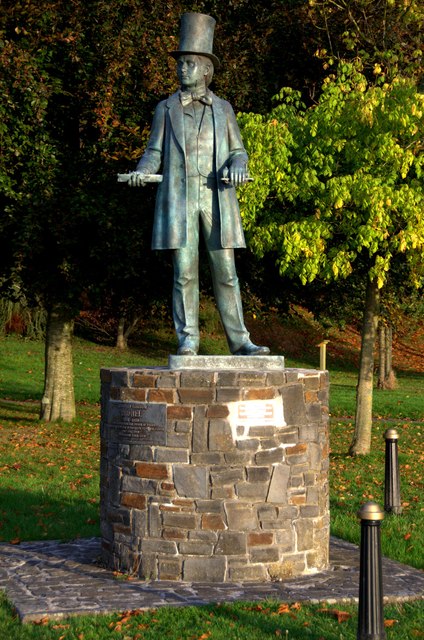Until the mid 19th century, Neyland was a sleepy little fishing village with a handful of cottages and a slow pace of life which had followed the seasons for time immemorial.
But in the mid 1800s, Isambard Kingdom Brunel arrived to instigate a cataclysmic change that would turn Neyland into a thriving Victorian town and become instrumental in revolutionising the public transport system throughout Wales.
Born in Portsmouth on April 9, 1806, the mechanical and civil engineer went on to gain recognition as one of the most ingenious and prolific men of the Industrial Revolution.
And this claim continues well into the 21st century. A BBC poll carried out in 2002 to select the greatest ever Briton named Brunel as second.
Brunel’s original intention was to connect London with Ireland and New York via Gloucester and Abermawr, which is near Fishguard where he proposed building a new seaport.
But as a result of his financial restraints, he changed his plans.
As a result, the great western terminus was subsequently established in Neyland on April 15, 1856 when the South Wales Railway was officially opened.
The opening of the railway resulted in a complete transformation for the town of Neyland and the entire eastern part of Llanstadwell parish.
New houses sprang up to house the railway workers, a steamship service commenced in August 1856 to Waterford and later to Cork and a huge pontoon, designed by Brunel, was launched in the spring of 1857 to facilitate the transport of passengers and livestock to and from Ireland.
In 1858 a steamship route from Neyland to Portugal and Brazil was inaugurated and the same year the railway company decreed that Neyland would consequently be known as the New Milford. This name continued to be used until it was eventually discarded in August 1906.
As a result of the transformation, the population of Llanstadwell parish increased dramatically from around 200 prior to the boom to 1,045 in 1861.
The impressive South Wales Hotel opened in 1858 while the Picton Caste and Lawrenny Estates granted numerous leases for further houses to be built for the growing population. Four new chapels and numerous shops were added to the town while new services and conveniences began appearing on a regular basis.
By now, Neyland had acquired an importance and a status which its former residents could never previously have dreamed off.
And it was all thanks to Isambard Brunel, who is widely acknowledged as being the founder of Neyland town.
Neyland was a true railway boomtown. The population of Llanstadwell Parish increased dramatically to one thousand and forty five people in 1861 and an impressive hotel, the South Wales Hotel, opened in 1858. The Picton Castle and Lawrenny Estates, which chiefly comprised Neyland, granted numerous leases for house building. Four new chapels and shops were added and new services and conveniences appeared. Neyland acquired an importance and status, which the inhabitants of the sleepy little village could never have dreamed of.


















